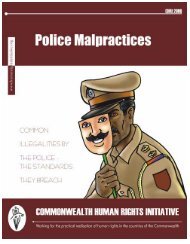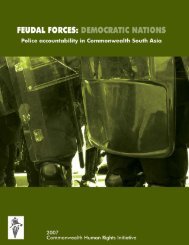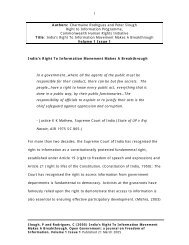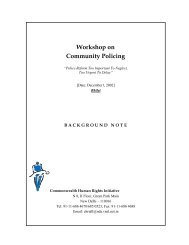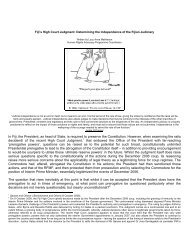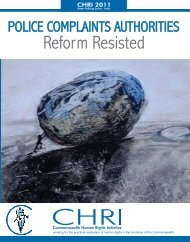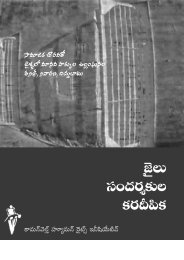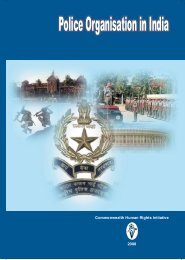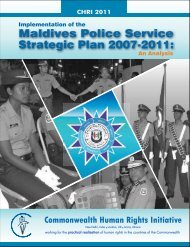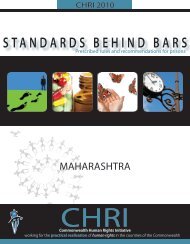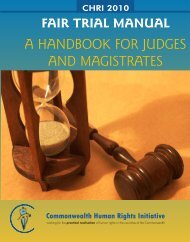The UK Anti-Terrorism Crime & Security Act 2001 - Commonwealth ...
The UK Anti-Terrorism Crime & Security Act 2001 - Commonwealth ...
The UK Anti-Terrorism Crime & Security Act 2001 - Commonwealth ...
You also want an ePaper? Increase the reach of your titles
YUMPU automatically turns print PDFs into web optimized ePapers that Google loves.
CHRI News, February 2002<br />
<strong>The</strong> <strong>UK</strong> <strong>Anti</strong>-<strong>Terrorism</strong> <strong>Crime</strong> &<br />
<strong>Security</strong> <strong>Act</strong> <strong>2001</strong>: Too Much...Too Soon<br />
Colin Nicholls is a Queen’s Counsel practising in London and specialising in international crime<br />
including extradition and criminal mutual assistance.<br />
He is Honorary Secretary of the <strong>Commonwealth</strong> Lawyers Association (CLA)<br />
Colin Nicholls QC<br />
On 14th December <strong>2001</strong> the British <strong>Anti</strong>- <strong>Terrorism</strong>, <strong>Crime</strong> and <strong>Security</strong> <strong>Act</strong> became law.<br />
Its object is to ensure the Government has adequate powers to counter the increased threat<br />
of terrorism in the United Kingdom following the events of September 11th.<br />
<strong>The</strong> <strong>Act</strong> contains: measures against terrorist funds including forfeiture, irrespective of<br />
whether proceedings have been brought for any offence, and the making of freezing orders<br />
against such funds including those of foreign governments and non- <strong>UK</strong> residents;<br />
provision for the disclosure of information by public authorities for the purpose of<br />
facilitating the work of the intelligence services; power of the Home Secretary to certify a<br />
non <strong>UK</strong> national a “suspected international terrorist” and to order his removal from the <strong>UK</strong>,<br />
or if this is prevented, his ditto detention indefinitely without charge, if the Home Secretary<br />
reasonably believes his ditto presence is a risk to national security; measures to ensure the<br />
security of the nuclear, chemical and aviation industries and dangerous substances, including<br />
power to remove unauthorised persons from airport restricted zones and aircraft; the<br />
extension of police powers, including the taking and indefinite retention of fingerprint<br />
records for purposes of terrorist investigation and the removal of items believed to be worn<br />
for concealing identity; the retention of communications data by communications service<br />
providers for access by law enforcement agencies, not including the contents of<br />
communications; strengthening of the law relating to international corruption to include<br />
bribery of foreign public officials and making it an offence for any <strong>UK</strong> national to perform<br />
acts abroad which would amount to corruption if committed in England; the<br />
implementation of the third pillar of the European Union so that EU wide anti-terrorist<br />
measures on policing, extradition and sentencing can be effected; the re-introduction of an<br />
offence of general failure to disclose information about terrorism.<br />
<strong>The</strong> Bill was introduced by the Home Secretary, David Blunkett, on 15th October. On 12th<br />
November he laid an order before Parliament that a state of “public emergency threatening<br />
the nation” existed, necessitating a derogation from Article 5 of the European Convention<br />
on Human Rights (ECHR), the ECHR provisions which guarantee personal security.<br />
Four days later, an All-Party Joint Committee on Human Rights cautioned against the speed<br />
with which the Bill had been introduced. Foremost in its criticism were: the fact that some<br />
of the proposed measures did not relate to terrorism at all; the exclusion of judicial review of<br />
the Home Secretary’s power to order detention; and the introduction of European measures,<br />
including police co-operation and simplified extradition procedures, without adequate<br />
parliamentary scrutiny.
On 6th December the Bill was defeated seven times in the House of Lords. By the time it<br />
was passed on 14 th December, just one month after its publication, it had suffered a total of<br />
twelve report stage defeats and some of its most controversial measures had been amended<br />
or abandoned. It was commented in <strong>The</strong> Independent newspaper that it “was improved by<br />
the compromises agreed at the last minute, but it remains a deeply offensive, illiberal and<br />
unnecessary set of measures.”<br />
<strong>The</strong> compromises included the establishment of a Special Immigration Appeals<br />
Commission, presided over by a senior judge, to hear challenges against the Home<br />
Secretary’s orders against non <strong>UK</strong> nationals suspected of being “international terrorists”,<br />
with a right of appeal to the Court of Appeal on a point of law.<br />
<strong>The</strong> complaint remains, however, that the Home Secretary’s belief and suspicion that a<br />
person is an “international terrorist” may be based on evidence which is not disclosed to the<br />
suspect and confirmed by a judicial body which can hold hearings in secret and base its<br />
decision on secret evidence.<br />
Although supportive of some measures including those relating to terrorist funds, human<br />
rights bodies have been vociferous in condemning many of the provisions of the <strong>Act</strong> on the<br />
grounds that they were not “necessary”, are unlikely to avert terrorists and liable to be<br />
counterproductive. Why is it, they ask, that the United Kingdom, alone amongst signatories<br />
to the ECHR and so soon after passing the Human Rights <strong>Act</strong>, has felt it necessary to<br />
revoke one of its basic provisions to fight terrorism? <strong>The</strong>y complain that there is no way of<br />
testing whether the authorities’ actions are proportionate having regard to the secrecy<br />
surrounding them and they have promised to challenge the legislation in domestic courts and<br />
the European Court of Human Rights. Amnesty International has complained that the <strong>Act</strong><br />
will result in the creation of “a shadow criminal justice system in which the normal<br />
safeguards protecting the rights to liberty and fair trial are being eroded”. Gareth Peirce, a<br />
prominent human rights lawyer, has commented on the inability of police and intelligence<br />
services to understand the distinction between resistance to oppression and support for<br />
terrorism, which recalls a similar comment in the debates in the House of Lords on the<br />
attitude which would have been adopted towards those who fought against apartheid, the socalled<br />
Nelson Mandela point.<br />
Despite the criticisms, the <strong>Act</strong> will remain law until it is reviewed by a committee of Privy<br />
Councillors within two years. <strong>The</strong> provisions for the removal and detention of non <strong>UK</strong><br />
nationals will expire in May 2003 when the Home Secretary may by order repeal them, revive<br />
them for up to a year, or continue them in force for a period not exceeding one year. A<br />
number of North African and Middle Eastern suspects were already in detention in the<br />
United Kingdom before the <strong>Act</strong> on international terrorist charges, mostly awaiting<br />
extradition, some to the United States. <strong>UK</strong> police have made their first arrests under the <strong>Act</strong>.<br />
It remains to be seen, in so far as is allowed, whether the <strong>Act</strong> is effective in averting terrorist<br />
attacks and the extent to which miscarriages of justice will occur.<br />
<strong>The</strong> United Kingdom’s practical response to the events of September 11th is not alone. On<br />
28th September, the United Nations <strong>Security</strong> Council adopted Resolution 1373, calling on<br />
states to work together urgently to prevent and suppress terrorist acts. It required them to<br />
take measures of the kind included in the <strong>Act</strong>. On 25 th October, <strong>Commonwealth</strong> Heads of
Government issued a statement calling for concerted action against terrorism and<br />
<strong>Commonwealth</strong> countries are currently considering their collective response.<br />
In recent decades the interests of the community have appeared at times to be obscured by<br />
the rights of the individual. However, when the community is threatened, individuals’ rights<br />
are usually curtailed. Just as it fell to the House of Lords during the passing of the Bill to<br />
temper government zeal, it will be the responsibility of international human rights bodies to<br />
monitor carefully the enforcement of anti-terrorist legislation and to ensure that miscarriages<br />
of justice are avoided.



